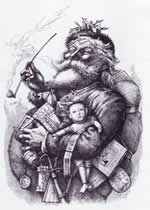 Today my students have been talking about Santa Claus.
Today my students have been talking about Santa Claus.Living in a very conservative community, the students have well-formed opinions about what is true regarding our well-fed saint. However there are those who are yet able to dwell in the mystery of some of the growing legends regarding St. Nicholas. "Mr. Hildebrand, is Santa real?" I needed to remind them of the book I read to them this morning and how sometimes it will be my job not to give them answers, but to offer questions instead.
"Have you ever seen Santa? What do your parents think? Wouldn't it be nice if he was real? Do you believe in Santa?"
Here is a short history of Saint Nicholas and the origin of Santa Claus.
I've been reading a series by Etan Boritzer written for children. It is a series titled "What is...?" Today I read What is Right? It poses many good questions and very few answers, which is it's intent. The discussions on the carpet afterward are fantastic. The look on the student's faces are a good indication of higher brain functioning.
It makes me a little uneasy not giving students the answers which they crave. I can remember being given the answers to everything and life being quite simple. When I look at my student's faces I can tell that their present would be less stressful if I simply gave them my opinion. Their future however would contain more of a challenge. The more children are fed other people's opinions as fact, the more they will have to process as personal truth later on in life. I don't think there should be any particular reason to rush children's personal development. If we can guide them in the right direction, using personal experience and insight as examples, children will have a better chance to come to some excellent conclusions on their own. All this is said not negating the work and guidance of the Holy Spirit in the child's life. God calls us to commune with him through the Holy Spirit.
On the other hand, I do feel that there are particular truths that need to be imparted. Michele Borba, author of Parents Do Make a Difference, has written a book titled Building Moral Intelligence where she outlines the seven essential virtues that teach kids to do the right thing. The seven virtues are Empathy, Conscience, Self-Control, Respect, Kindness, Tolerance, and Fairness.
As Aristotle taught, people do not naturally become morally excellent or practically wise. They become so, if at all, only as the result of life-long personal and community effort. - Jon Moline
It takes a village to raise a child.
1 comment:
i dont know , im not a child anymore, but i still believe in santa, the only thing we have to do is believe and well be happy.
Post a Comment